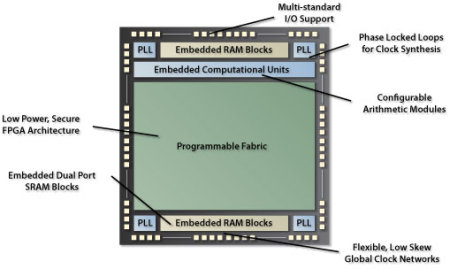Linux-ready SDIO controller supports multiple memory cards
May 12, 2008 — by Eric Brown — from the LinuxDevices Archive — 1 viewsQuickLogic has upgraded its SDIO host controller IP (intellectual property) with support for multiple, independent memory cards. Available for three different QuickLogic FPGAs (field programmable gate arrays), the SDIO PSB (“proven system block”) targets handheld devices that require more than the typical 8GB available per memory card, says QuickLogic.
The controller is integrated in the company's Customer Specific Standard Product (CSSP) platform library for handheld systems, says QuickLogic. The PSB can be implemented in the programmable fabric of QuickLogic's PolarPro or Eclipse II FPGAs, or it can augment the base SDIO controller built into the ArcticLink family of FPGA-based controllers. The Eclipse II family of low-power FPGAs is available in 8×8 mm packages suitable for handheld gadgets, and supported with Linux drivers for IP functions such as IDE, PCI, and SDIO interfaces.
The new SDIO host controller IP handles four independent cards, but can be custom-configured for as many card slots as are needed, the company said. The controller is compatible with SD, SDHC (secure digital high capacity), and MMC memory cards with 4-bit and 8-bit widths, says QuickLogic, supporting up to 32GB per card, for a potential total of 128GB of flash-based storage. Target applications are said to include storage for personal navigation devices, portable media players, and other handhelds.

Eclipse II architecture
The controller supports simultaneous mixed card types and capacities, says the company, and can also accept SD-based Managed NAND devices such as Sandisk's iNAND, as well as embedded MMC (eMMC) devices like Samsung's MoviNAND. The controller is said to sense the type of controller on start-up for automatic configuration, and can be modified to designate a single card or attached memory device as a boot device. Driver support is offered for Linux, Windows CE, and Windows Mobile.
Stated Judd Heape, QuickLogic's senior director of systems engineering, “Handheld device designers are looking to expand their product's data storage beyond the 8 Gbyte limit of today's memory cards, but don't want to use hard disk drives.”
Availability
QuickLogic's “enhanced SDIO host controller PSB” is available immediately with Linux drivers in a four-slot configuration, says the company, which did not release pricing.
This article was originally published on LinuxDevices.com and has been donated to the open source community by QuinStreet Inc. Please visit LinuxToday.com for up-to-date news and articles about Linux and open source.